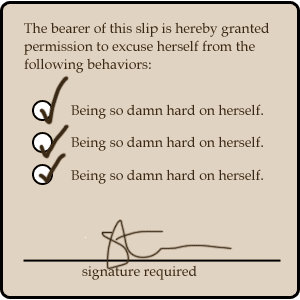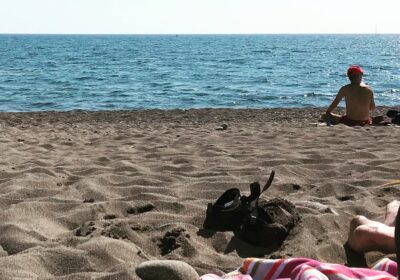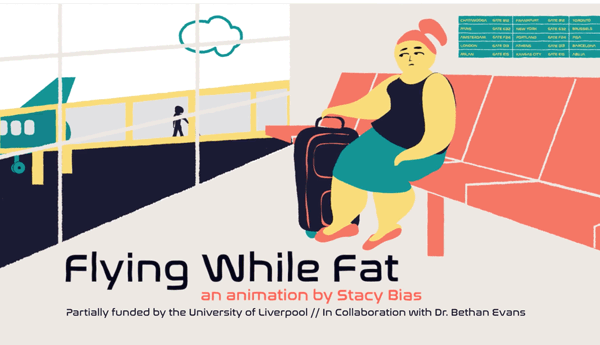Permission Slip for the Psyche

 I have been thinking these last several months about how critical I am of myself. I believe this was brought on by an experience at NOLOSE this summer, the re-emergence of some past trauma and by my posting some reactions to this publicly. This was both helpful and excruciating. The excruciating part came with the crippling judgment/shame that I placed on myself for the decision to share such personal, intimate details publicly. This started a really intense shame-spiral that I’ve been dealing with ever since.
I have been thinking these last several months about how critical I am of myself. I believe this was brought on by an experience at NOLOSE this summer, the re-emergence of some past trauma and by my posting some reactions to this publicly. This was both helpful and excruciating. The excruciating part came with the crippling judgment/shame that I placed on myself for the decision to share such personal, intimate details publicly. This started a really intense shame-spiral that I’ve been dealing with ever since.
This is exacerbated by my impending move to England, where stereotypes of stoicism, independence, privacy and reserved emotionality are seemingly at a premium. Leaving the warm bubble of the woo-woo NW, where a tender community, sweet connection and open sharing are my mainstays, I fear I will be thought strange, judged and excluded. I have been telling myself stories of getting a ‘thicker skin’ and ‘sucking it up’ and becoming more emotionally independent — as if this is the most proper course of action, to change to fit in, as if it would be better for me anyway. The truth of the matter is, for the most part (if I were able to stop judging myself so harshly) I actually quite like who I am. All the better qualities within myself are those I seek out in others. I’m no walk in the park — no one is — but for the most part, I think I’m a good egg. I try my best.
Below is something I’ve been working on for a while. It’s sort of a permission slip for my psyche. I wrote it up to call upon it when I need reminding. Perhaps some of you feel similarly and will, at times, need reminding yourselves. In that spirit, I share it here.
1) It’s OK to believe in something.
Somewhere in the back of my brain I have formed the belief that a cold, steely refusal to believe in any ‘woo-woo nonsense’ is somehow a more evolved or intelligent mindset. People who believe in nothing and who regard any religion or spiritual beliefs as weak or lacking in critical thought have always been able to twist me in on myself. It occurred to me recently, however, that NOT believing is just as polarized a belief as anything else. To staunchly believe in nothing is just as seemingly ridiculous as believing uncritically in everything. We all base our beliefs on the knowledge we’ve got — which is barely a fraction of the knowledge that’s possible. The assumption that we know anything about our origins ‘for sure’ is, to my mind, over-confident.
My personal spirituality has largely settled as “take what you want and leave the rest.” I believe that much is implausible, but anything is possible — and what matters, regardless, is being kind, maintaining compassion and empathy, doing what you can to move things toward joy and away from suffering. I believe that ritual sets intention, and intention – whether for mystical reasons or no – positions us as more likely to achieve our goals simply by keeping us mindful of and focused on them. I believe that Tarot and astrological readings, whether mystical or no, help us divine our own subconscious for answers — how we interpret the cards, what we read into the readings — these things help us know ourselves. They are tools – like therapy is a tool, like academic study is a tool. I believe there is so much we don’t yet know, and so much we never will. Staying open to the possibility of more is fun. Binaries are limiting – in all capacities.
2) It’s OK to be “sensitive”, to feel things deeply – and to speak it out loud.
Much like I have consistently deferred to the spiritually-reserved, I have also tended to defer to the emotionally self-sufficient. Those who live closer to the cuff, who hold back their emotions for ‘appropriate’ times, or who don’t share their personal details publicly. I’ve always been in awe of people whose opinion of themselves are enough — who don’t ask for feedback, or require input on decision-making. I have often regarded my own desire for input and involvement in my life from friends and community as somehow weak, narcissistic, self-indulgent. I have often regarded my tendency to be emotionally impacted by the circumstances in my life, and to talk about that publicly, as the same.
I remember sitting on the stage at NOLOSE this year and saying something out loud for the first time in my life — something that had carried with it so much shame, so much disappointment in myself (and from others) — and breaking down for what felt like an eternity in front of so many people. I was unable to collect myself and in that moment, rather than simply accepting the love and support of that community, which I truly believe was being offered, in my mind there was a flashing banner of judgment scrolling “classic american overshare” in neon letters. I was judging myself for taking up space with my ‘issues’, for taking myself too seriously, and for being weak and vulnerable in public. I turned the friendly faces of my loving community into judging eye-rolls, rib jabs, yawns of boredom, and quietly whispered “get it togethers.” It’s an ugly face I put on my community — one that sees vulnerability as weakness, who sees a desire for inclusion and connection as need, and need as weakness, one that bullies and judges and seeks dominance for its own amusement.
Nevermind the teary-eyed confessions of those who came up aftewards, thanking me for saying things aloud that they could identify with — asking for connection and discussion, wanting to speak about this themselves. None of those sweet moments of positive feedback could dissuade my own internal dialogue of self-shaming. I isolated myself in judgment, letting the few who said nothing speak more loudly than those who reached to engage me. No more of this.
My tenderness is one of the most beautiful parts of me – it keeps me open, loving and capable of great joy. It keeps me aware, compassionate and capable of empathy. I have fought through scenarios I actually won’t speak about publicly to keep it. Being reserved, collected and outwardly unemotional is not better or more evolved than being earnest, vulnerable and openly heartfelt. These are coping mechanisms, both – learned behaviors, reinforced by life experience and the people who influenced us along the way. What works for one does not work for all and neither is better or worse. Again, the only errant belief is the one that assumes it knows best.
3) It’s OK to be unsure of yourself.
Of all the parts of myself that I tend to judge, my lack of self-assurance ranks most highly. This gets meta, to say the least. Not only do I judge myself, but I judge myself for judging myself. Exhausting. I was raised in an extreme, dichotomous household with one half tyrannical dominance and one half apologetic submission. As a result, I am constantly struggling to find the middle ground within my own self. By virtue of my upbringing, my fight-or-flight instinct causes me to reflexively defer to aggressive confidence (or to emotional bullying.) This is not weakness. This is a self-loving habit of survival that has ultimately outgrown its usefulness.
Confidence and self-love are journeys. Some start at a deficit, some don’t. By virtue of my youth, my personal journey starts well underground and, for all my climbing, I am only just now beginning to see the light of day. In the end, we are all products of our environment and those who have been able to garner self-confidence from their life experience should be grateful and acknowledge and utilize that privilege rather than using it to judge and oppress those who haven’t had as much support, as many opportunities or as much time to heal. Do not bully the under-confident. And for those who share my struggles with self-assurance, do not be bullied and most of all, do not bully yourself. You are brave. You’ll continue your progress. Don’t forget.
4) It’s OK to care what people think.
We are pack animals by nature. We all inherently want to belong somewhere – whether it’s enough to fit in with just one person, or whether we need an entire community – by in large, all humans need *some* sense of connection. For this reason, we all care on some level what people think of us and of our actions. Some are more selective about whose opinion they choose to consider and some are more open to the larger whims of society. This is not static, either. That ratio varies wildly over a lifetime. And sometimes we choose our identities in order to maximize the chance of finding what we need, and sometimes our identities do the dictating themselves.
What’s important to remember is that there is no norm. There is only access and opportunity. Each group finds itself by chance and each group is convinced of its own value by virtue of peer reinforcement within the group. No one is wrong. No one is right. We all simply are. Being punk rock, DIY, a self-professed freak – these identities have no greater value than being a republican, middle-class, or a self-professed ‘jesus freak.’ Whatever you are, be it because it makes you joyful. Whatever you aren’t, acknowledge that it brings joy to those who occupy it. Joy is not unilateral. We are all as misguided and mislead as everyone else in our own ways. But that’s OK. We’re finding each other as best we can. It’s OK to need one another. Being overly-independent is no more evolved than being overly-dependent. The truth is most often in the middle. Don’t judge yourself for wanting to belong. We all do.




June 7, 2014 at 8:39 pm
Dagny Kight
Are you saying that atheism is “staunchly believing in nothing”?? As it would surprise me greatly for you to make a statement so vacuous. I hope I’ve misunderstood something here.
November 26, 2010 at 1:21 pm
Holly
I know this is a tangential thing but… don’t let the stereotypes about England psyche you out. I’m an American who moved here a few years ago, and I have found more emotional honesty and less judgmentalism than I would’ve dreamed existed, in the cold hard north of England. It’s why I feel at home amongst my friends here. My family has always baffled me; a bunch of people who don’t seem to like each other or have much in common other than the accident of birth, feeling compelled to spend their holidays together and then go home complaining about each other. My friends, on the other hand, are intelligent, spontaneous, thoughtful, understanding, and damn near magical sometimes when it comes to knowing what I need better than I know it myself and being able to help me get it. They are a wonder and, this Thanksgiving, hands down the thing I am most grateful for.